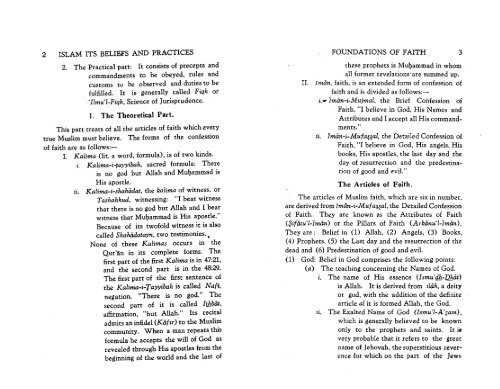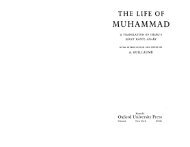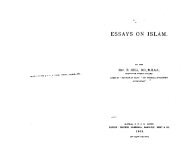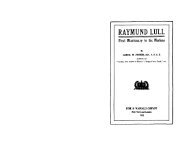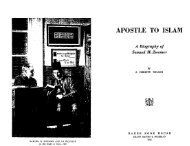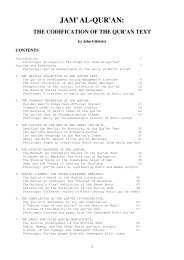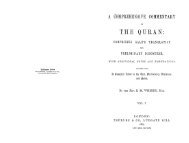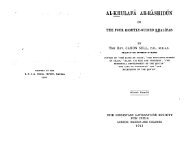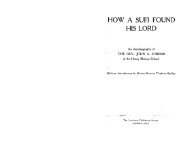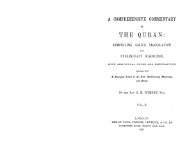Islam Its Belief and Practices - Radical Truth
Islam Its Belief and Practices - Radical Truth
Islam Its Belief and Practices - Radical Truth
You also want an ePaper? Increase the reach of your titles
YUMPU automatically turns print PDFs into web optimized ePapers that Google loves.
2 ISLAM ITS BELIEFS AND PRACTICES FOUNDATIONS OF FAITH 3<br />
2. The Practical part: It consists of precepts <strong>and</strong><br />
comm<strong>and</strong>ments to be obeyed, rules <strong>and</strong><br />
customs to be observed <strong>and</strong> duties to be<br />
fulfilled. It is generally called Fiqh or<br />
'Ilmu'Z-Fiqh, Science of Jurisprudence.<br />
I. The Theoretical Part.<br />
This part treats of all the articles of faith which every<br />
true Muslim must believe. The forms of the confession<br />
of faith are as follows:-<br />
I. KaZima Oit. a word, formula), is of two kinds.<br />
i. Kalima-i-tayyibah, sacred formula: There<br />
is no god but Allah <strong>and</strong> Mul,1ammad is<br />
His apostle.<br />
ii. Kalima-i-shaluidat, the kaZima of witness, or<br />
Tashahhud, witnessing: "I bear witness<br />
that there is no god but Allah <strong>and</strong> I bear<br />
witness that Mul,1ammad is His apostle."<br />
Because of its twofold witness it is also<br />
called Shahiidatayn, two testimonies.•<br />
None of these Kalimas occurs in the<br />
Qur'an in its complete forms. The<br />
first part of the first Kalima is in 47:21,<br />
<strong>and</strong> the second part is in the 48:29.<br />
The first part of the first sentence of<br />
the Kalima-i-Tayyibah is called Nafi,<br />
negation, "There is no god." The<br />
second part of it is called Ithbiit,<br />
affirmation, "but Allah." <strong>Its</strong> recital<br />
admits an infidel (KQ,f>r) to the Muslim<br />
community. When a man repeats this<br />
formula he accepts the will of God as<br />
revealed through H,s apostles from the<br />
beginning of the world <strong>and</strong> the last of<br />
II.<br />
these prophets is Mul,1ammad in whom<br />
all former revelations'are summed up.<br />
I man. faith, is an extended form of confession of<br />
faith <strong>and</strong> is divided as follows:-<br />
i.- Iman-i·MujmaZ, the Brief Confession of<br />
Faith, "I believe in God, His Names <strong>and</strong><br />
Attributes <strong>and</strong> I accept all His comm<strong>and</strong>ments,"<br />
ii. Iman-i-MufaHaZ, the Detailed Confession of<br />
Faith, "I believe in God, His angels, His<br />
books, His apostles, the last day <strong>and</strong> the<br />
day of resurrection <strong>and</strong> the predestination<br />
of good <strong>and</strong> evil."<br />
The Articles of Faith.<br />
The articles of Muslim faith, which are six in number,<br />
are derived from Iman-i-MufaHal, the Detailed Confession<br />
of Faith. They are known as the Attributes of Faith<br />
($ifatu'Z-lman) or the Pillars of Faith (Arkanu'l-lman).<br />
They are: <strong>Belief</strong> in (1) Allah, (2) Angels, (3) Books,<br />
(4) Prophets, (5) the Last day <strong>and</strong> the resurrection of the<br />
dead <strong>and</strong> (6) Predestination of good <strong>and</strong> evil.<br />
(1) God: <strong>Belief</strong> in God comprises the following points:<br />
(a) The teaching concerning the Names of God.<br />
i. The name of His essence (Ismu'dh-W!at)<br />
is Allah. It is derived from iliih, a deity<br />
or god, with the addition of the definite<br />
article aZ it is formed Allah, the God.<br />
Ii, The Exalted Name of God (lsmu'Z-A';am) ,<br />
which is generally believed to be known<br />
only to the prophets <strong>and</strong> saints. It is<br />
very probable that it refers to the great<br />
name of Jehovah, the superstitious reverence<br />
for which on the part of the Jews


